Waid Surname Ancestry ResultsOur indexes 1000-1999 include entries for the spelling 'waid'. In the period you have requested, we have the following 30 records (displaying 1 to 10): Single Surname Subscription | | | Buying all 30 results of this search individually would cost £146.00. But you can have free access to all 30 records for a year, to view, to save and print, for £100. Save £46.00. More... |
These sample scans are from the original record. You will get scans of the full pages or articles where the surname you searched for has been found. Your web browser may prevent the sample windows from opening; in this case please change your browser settings to allow pop-up windows from this site. Crigglestone Lay Subsidy: Final Return
(1545)
The lay subsidy of Agbrigg wapentake in the West Riding of Yorkshire (207/186) is in two parts: the anticipation and the final return. The subsidy, assessed at 1d in the pound on goods up to £5, 2d in the pound on goods worth £5 and above, and 2d in the pound on land, had been granted by parliament to king Henry VIII for three years. The anticipation, certified by the commissioners 30 April 1545, listed by township the holders of £6 or more in land or £10 or more in goods 'which said persons by virtue of our souerayng lords most jentill request and lovyng desire ar content frankly, quietly and indeladby to pay ther last payment' in advance, by way of anticipation of the third year's payment. The final return, certified 26 October 1545, lists the less wealthy part of the population, again by township, with their full names, assessment of their property, and (right-hand column) the amount due to be collected from them.WAID. Cost: £4.00.  | Sample scan, click to enlarge
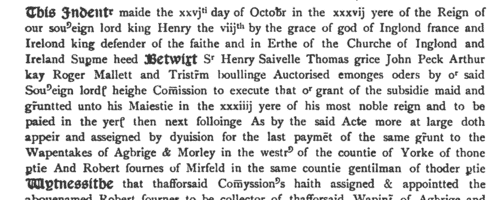
| Ossett Lay Subsidy: Final Return
(1545)
The lay subsidy of Agbrigg wapentake in the West Riding of Yorkshire (207/186) is in two parts: the anticipation and the final return. The subsidy, assessed at 1d in the pound on goods up to £5, 2d in the pound on goods worth £5 and above, and 2d in the pound on land, had been granted by parliament to king Henry VIII for three years. The anticipation, certified by the commissioners 30 April 1545, listed by township the holders of £6 or more in land or £10 or more in goods 'which said persons by virtue of our souerayng lords most jentill request and lovyng desire ar content frankly, quietly and indeladby to pay ther last payment' in advance, by way of anticipation of the third year's payment. The final return, certified 26 October 1545, lists the less wealthy part of the population, again by township, with their full names, assessment of their property, and (right-hand column) the amount due to be collected from them.WAID. Cost: £4.00.  | Sample scan, click to enlarge
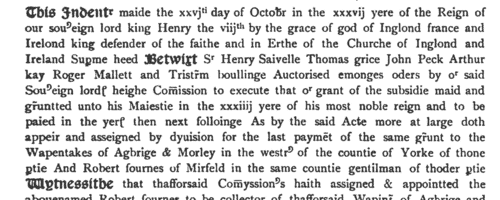
| Sandal Lay Subsidy: Final Return
(1545)
The lay subsidy of Agbrigg wapentake in the West Riding of Yorkshire (207/186) is in two parts: the anticipation and the final return. The subsidy, assessed at 1d in the pound on goods up to £5, 2d in the pound on goods worth £5 and above, and 2d in the pound on land, had been granted by parliament to king Henry VIII for three years. The anticipation, certified by the commissioners 30 April 1545, listed by township the holders of £6 or more in land or £10 or more in goods 'which said persons by virtue of our souerayng lords most jentill request and lovyng desire ar content frankly, quietly and indeladby to pay ther last payment' in advance, by way of anticipation of the third year's payment. The final return, certified 26 October 1545, lists the less wealthy part of the population, again by township, with their full names, assessment of their property, and (right-hand column) the amount due to be collected from them.WAID. Cost: £4.00.  | Sample scan, click to enlarge
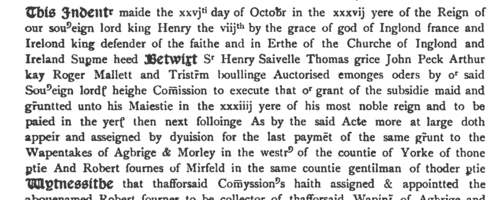
| Warley Lay Subsidy: Anticipation
(1545)
The lay subsidy of Agbrigg wapentake in the West Riding of Yorkshire (207/186) is in two parts: the anticipation and the final return. The subsidy, assessed at 1d in the pound on goods up to £5, 2d in the pound on goods worth £5 and above, and 2d in the pound on land, had been granted by parliament to king Henry VIII for three years. The anticipation, certified by the commissioners 30 April 1545, listed by township the holders of £6 or more in land or £10 or more in goods 'which said persons by virtue of our souerayng lords most jentill request and lovyng desire ar content frankly, quietly and indeladby to pay ther last payment' in advance, by way of anticipation of the third year's payment. The final return, certified 26 October 1545, lists the less wealthy part of the population, again by township, with their full names, assessment of their property, and (right-hand column) the amount due to be collected from them.WAID. Cost: £4.00.  | Sample scan, click to enlarge
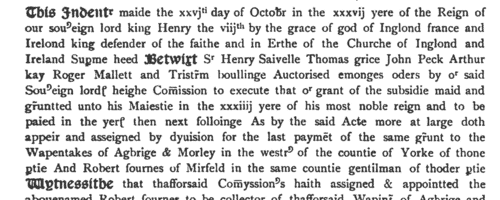
| Scottish litigants, rebels and cautioners
(1592-1599)
The Privy Council of Scotland exercised a superior judicial authority in the kingdom, and consequently received and dealt with a constant stream of petitions, as well as dealing with the internal security of the state. This register of the council from August 1592 to May 1599, in the reign of king James VI, was edited by David Masson and published under the direction of the Deputy Clerk Register of Scotland in 1882. The publication brings together the contents of the principal register (Acta Secreti Concilii) with acts and bands (bonds) of caution (surety) from the registers called Acta Cautionis (pp 561-730); Acts and Ordinances relating to the Borders and the North (731-748); and Miscellaneous Privy Council Papers (749-769). Many of the individuals mentioned are the complainants, those of whom they complained, and the sureties on both sides: at this period, many of the complainants are alleging serious attacks, often of a feuding nature. Many of the bonds entered into by the cautioners are promises to keep the peace towards such enemies. Failure to answer to the council when summoned was a serious contempt, leading to being denounced a rebel, with serious consequences.
WAID. Cost: £4.00.  | Sample scan, click to enlarge

| Knaresborough testators, legatees and witnesses
(1510-1606)
Knaresborough in the West Riding of Yorkshire lay in the ancient diocese of York, but was part of a large separate probate jurisdiction or peculiar encompassing the parishes of Burton Leonard, Farnham cum Scotton, Fewston, Great Ouseburn, Hampsthwaite, Knaresborough, South Stainley, Staveley, and some small adjoining areas. Grants of probate and administration, as well as copies of wills, were recorded on the Knaresborough court rolls. Dr Francis Collins prepared abstracts of all enrolled wills, grants of administration, and of tuition, from the 2nd year of the reign of king Henry VIII to the 3rd and 4th of James I, 'no matter how insignificant in life the testator may have been or how uninteresting the will', and these were published by the Surtees Society in 1902.WAID. Cost: £4.00.  | Sample scan, click to enlarge
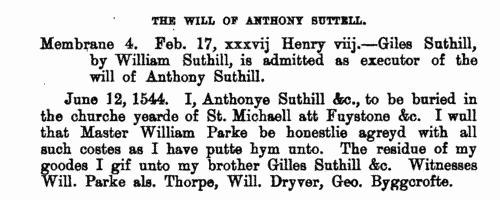
| Official Papers
(1603-1610)
The State Papers Domestic cover all manner of business relating to England, Scotland, Ireland and the colonies, conducted in the office of the Secretary of State as well as other miscellaneous records.
WAID. Cost: £4.00.  | Sample scan, click to enlarge

| Boys entering Sedbergh School
(1662-1674)
B. Wilson prepared this edition of the register of the Grammar School at Sedbergh in the West Riding of Yorkshire, published in 1895. Sedbergh school had three exhibitions at St John's College, Cambridge, and for the earliest years little more could be found about the pupils at the school than was recorded at St John's or other colleges. In 1700-1706 the first material from Sedbergh appears, but no more than lists of surnames. From 1746 onwards full names, or surnames and initials, are found for those boys who did not continue to university. It is only from 1820 onwards that the school register starts to give detail: month of entry, age, birthplace, and month of leaving. From then onwards Wilson was able to add more and more biographical detail, except, of course, for those boys in 1895 still at the school or with their careers yet ahead of them.WAID. Cost: £4.00.  | Sample scan, click to enlarge
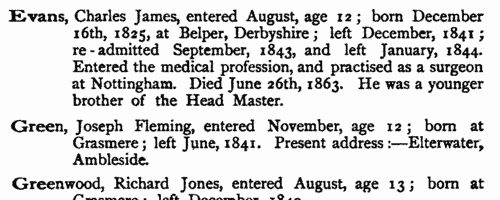
| Tradesmen of York
(1559-1759)
No man or woman could trade in the city of York without having obtained 'freedom' of the city. Their names were recorded on the 'Freemen's Roll', or Register of the Freemen of the City of York, which contains about 16,600 names for this period. A list of names was prepared for each year. Each annual list starts with the name of the mayor and the camerarii or chamberlains. The chamberlains were freemen charged with the duty of receiving the fees of the new freemen; of seeing that only freemen traded in the city; and of preparing this roll, which was compiled from the names on their own account books from the receipts for the fees. There are three groups of freemen: those who obtained freedom after serving out an apprenticeship to a freeman; the children of freemen (per patres); and a handful who claimed freedom by 'redemption', i. e. by purchase or gift from the Mayor and Court of Aldermen.
WAID. Cost: £2.00.  | Sample scan, click to enlarge

|  Masters of Apprentices registered in Nottinghamshire
(1777) Masters of Apprentices registered in Nottinghamshire
(1777)
Apprenticeship indentures and clerks' articles were subject to a 6d or 12d per pound stamp duty: the registers of the payments usually give the master's trade, address, and occupation, and the apprentice's name, as well as details of the date and length of the apprenticeship. There are central registers for collections of the stamp duty in London, as well as returns from collectors in the provinces. These collectors generally received duty just from their own county, but sometimes from further afield. The indentures themselves can date from a year or two earlier than this return. (The sample entry shown on this scan is taken from a Bristol return. Each entry has two scans, the other being the facing page with the details of the indenture, length of service, and payment of duty.) IR 1/60WAID. Cost: £8.00.  | Sample scan, click to enlarge

|
Research your ancestry, family history, genealogy and one-name study by direct access to original records and archives indexed by surname.
|













